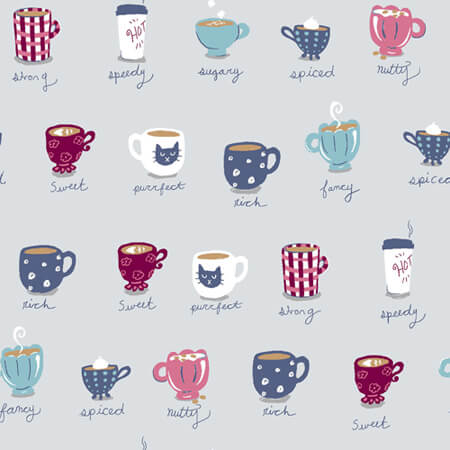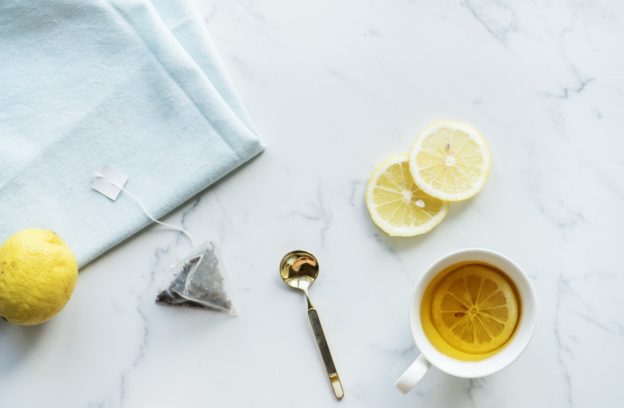This is the most wonderful time of year to wrap yourself in a warm blanket and hibernate. Unfortunately, hibernation isn’t always a choice. Winter is also host to a number of viruses, ranging from the common cold to the flu. The sniffles might send you back to bed more often than you’d like. In addition to modern medicine, there are a number of soothing ways to treat a cold that taste much better than cough syrup.
We recover faster from colds when we allow our bodies to rest and heal. Get cozy in your softest pajamas, snuggle up under the covers, and make yourself a steaming pot of tea — the perfect beverage to compliment a day of binge watching the latest Netflix drama with a box of tissues.

Get comfortable in this Luxe Plush Robe in ‘Blush’ by PJ Salvage.
12 Herbal Teas to Soothe the Common Cold
1. White Tea. Similar to green tea, white tea has an antiseptic quality and actually destroys pathogenic bacteria in your body. Pathogenic bacteria are bacteria that can cause disease, so white tea might give your immune system a little boost during cold and flu season.
2. Lemongrass. Teas made with lemongrass serve as a balm for sore throats. Additionally, lemongrass is has antiviral properties that may assist in the healing process.
3. Cinnamon. Teas that contain cinnamon have a warming flavor and an extra kick. They also contain more antioxidants than other herbal teas. Some studies have shown that antioxidants may lower your risk of infections.
4. Ginger. Ginger tea or teas that contain ginger, will help relieve your sore throat and loosen up mucus that causes congestion due to a cold. If you’re feeling queasy, ginger is best known for its ability to calm an upset stomach because it can reduce nausea.
5. Cloves. Similar to ginger, herbal teas that contain cloves can make it easier to cough up phlegm and ease congestion. Another option is to simply add a few cloves to steeping tea. When the tea is finished steeping, strain the liquid or fish out the cloves with a spoon.
6. Black Tea. Please keep in mind that the caffeine may keep you up and prevent you from getting adequate rest. However, it’s good to know that new research from Harvard University concluded that people who drank five cups of black tea every day for two weeks transformed their immune system’s T cells. The cells pumped out 10 times more cold and flu virus-fighting interferon!

‘Spiced Coffee’ pajama pattern by Munki Munki. Available as a super soft flannel pajama set or just pajama pants.
7. Lemon. Lemon tea or adding a squeeze of lemon to your tea or water will give you a much-needed vitamin C boost, which can help the duration and severity of symptoms if you already have a cold.
8. Turmeric. Turmeric has been getting a lot of praise in the health and wellness community recently. The root is one of the most effective anti-inflammatories in existence. Turmeric tea can help reduce inflammation and relieve gastrointestinal discomfort.
9. Cayenne. It’s no secret that cayenne’s spicy heat is great for warming the body. When utilized in tea, cayenne can help with digestion issues, nausea, and has been known to help restore lost appetite.
10. Raw Honey. Stirring raw honey into your herbal tea will not only add a welcomed touch of sweetness, it will also add small amounts of vitamin C and folate. Honey also contains antibacterial properties. When honey coats the back of the throat, it not only soothes the cough, it can help prevent infection.
11. Sage. We associate sage more commonly with cooking savory dishes, but it can also be used to make a soothing herbal tea. Like ginger and lemongrass, sage eases sore throat discomfort. The herb also contains similar antiviral qualities.
12. Lemon Verbena. Lemon verbena is considered the most intense of the lemon-scented herbs. When used in a tea, lemon verbena has been known to help reduce very mild fevers, settle upset stomachs, and increase appetite. Additionally, lemon verbena tea soothes sore throats.
We hope these herbal teas and natural ingredients help you create a soothing and delicious drink to enjoy while you heal. Of course, always consult a medical practitioner before changing your diet or consuming any natural herbs that may interfere with other medications you may be taking. Feel better soon!
For more ideas for self-care, reading lists, and ideas for family fun this winter season, visit The Pajama Company blog at thepajamacompany.com/blog.






































